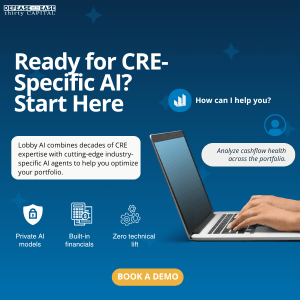In the rapidly evolving world of commercial real estate (CRE), the integration of advanced technologies and human intelligence is transforming the way firms operate. Among the most influential of these advancements are Artificial Intelligence (AI), Business Intelligence (BI), and Human Intelligence (HI). These three pillars not only enhance operational efficiency but also drive optimal growth and net operating income (NOI).
Continue reading for a brief overview or access the on-demand webinar here.
Understanding AI, BI, and HI
Artificial Intelligence (AI) refers to the use of machines and software to replicate human decision-making processes. AI in CRE finance can analyze vast datasets, identify patterns, and make predictions with unparalleled accuracy.
Business Intelligence (BI) encompasses tools and systems that analyze business data and provide actionable insights. For CRE, BI tools can sift through enormous amounts of information, helping businesses make data-driven decisions. These tools facilitate the efficient review of market trends, property performance, and financial metrics, which are crucial for strategic planning.
Human Intelligence (HI) remains indispensable in CRE. Despite advancements in AI and B
I, human insight and intuition are critical for setting goals, interpreting data, and making nuanced decisions. HI involves the application of experience, judgment, and creativity to guide the use of AI and BI tools effectively.
Practical Applications in CRE
The true power of AI, BI, and HI lies in their integration. While AI and BI can handle data-heavy tasks and provide analytical insights, HI brings in the critical thinking and contextual understanding needed to make strategic decisions. This synergy enhances the ability to optimize asset performance, manage risk, and drive NOI.
- Enhanced Predictive Analytics: AI-driven predictive analytics can forecast market trends by analyzing historical data and current market conditions. This allows CRE professionals to anticipate shifts in demand, rental rates, and property values with greater accuracy, enabling proactive decision-making. For instance, AI can help identify emerging neighborhoods that are likely to experience growth, enabling investors to make strategic acquisitions before prices rise.
- Streamlined Operational Efficiency: BI tools streamline operational processes by providing real-time insights into aspects of property management such as property performance, maintenance needs, and tenant satisfaction. By automating these processes, BI tools reduce the administrative burden on property managers, allowing them to focus on strategic tasks. Additionally, real-time data allows for quicker response times to issues, improving tenant satisfaction and retention rates.
- Advanced Risk Management: Risk management in CRE is complex, involving various factors such as economic conditions, market trends, and property-specific issues. AI enhances risk management by analyzing vast amounts of data to identify potential risks early and giving time to develop strategies to mitigate them, thus protecting investment value. For example, AI can monitor economic indicators and market conditions to predict potential downturns. CRE professionals can develop contingency plans and mitigate risks before they impact the portfolio.
- Personalized Tenant Experience: In today’s competitive CRE market, tenant satisfaction is paramount. AI can analyze tenant preferences, while human intelligence can craft personalized experiences, improving tenant satisfaction and loyalty. For instance, AI can track usage patterns of amenities and suggest personalized services to tenants, enhancing tenant satisfaction and loyalty. By integrating AI with HI, CRE professionals are able to craft tailored communication and engagement strategies that resonate with tenants.
- Comprehensive Investment Analysis: Investment decisions in CRE are often complex, involving numerous variables. BI tools simplify this process by providing comprehensive insights into the performance of different properties and investment portfolios. By analyzing data on rental income, operating expenses, and market conditions, BI tools help investors evaluate the ROI of potential investments. AI further enhances this by running predictive models to forecast future performance. This allows investors to make informed decisions based on data-driven insights.
Leveraging Technology
As AI and BI technologies continue to evolve, their integration with human intelligence will become even more critical. CRE professionals must stay abreast of technological advancements and continually refine their strategies to leverage these tools effectively. The ability to harness the combined power of AI, BI, and HI will be a key differentiator in the competitive CRE market.
The Strategic Importance of Scenario Modeling and Sensitivity Analysis
Additionally, scenario modeling and sensitivity analysis are crucial components of modern CRE portfolio management. By developing detailed scenario models, CRE professionals can simulate various “what if” situations. This includes changes in interest rates, shifts in market demand, or unexpected operational expenses. These models help in understanding the potential impact of different scenarios on the portfolio. Sensitivity analysis, on the other hand, helps identify the most critical variables affecting performance. By focusing on these variables, CRE professionals can develop targeted strategies to mitigate risks and optimize performance.
The Role of Real-Time Analytics in Proactive Decision Making
Real-time analytics also play a pivotal role in CRE portfolio management. By continuously monitoring key performance indicators (KPIs), CRE professionals can make timely adjustments to their strategies. This proactive approach ensures that issues are addressed before they escalate, and opportunities are seized as soon as they arise. Real-time analytics also provide a comprehensive view of the portfolio’s performance, allowing for data-driven decision-making.
Conclusion
Leveraging AI, BI, and HI is not just about adopting new technologies; it’s about creating a harmonious system where machines and humans work together to achieve optimal growth. For CRE professionals, this integration can drive significant improvements in operational efficiency, risk management, and overall profitability. By embracing these advancements, CRE firms can position themselves at the forefront of the industry, ready to tackle the challenges and opportunities of the future.
Next Steps
Watch the on-demand webinar, Thriving to ’25: Navigating Turbulent Times with Proactive Strategies in Commercial Real Estate, to dive deeper into these strategies and equip yourself with the tools needed to thrive in the current CRE landscape. Whether you’re looking to improve your operational efficiency or adapt to shifting market conditions, now is the time to take action and lead your business into the future. Contact our industry experts or schedule a complimentary consultation.
 The Lobby AI Mobile App is here! In the field, in meetings, on the go: instant portfolio insights right on your phone.
The Lobby AI Mobile App is here! In the field, in meetings, on the go: instant portfolio insights right on your phone. 



